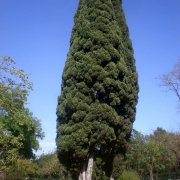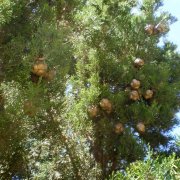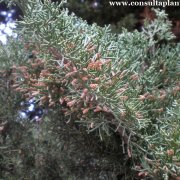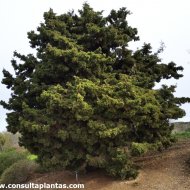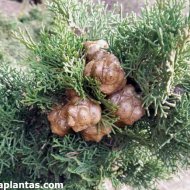Care of the tree Cupressus sempervirens or Mediterranean cypress |
|
The Cupressus genus, Cupressaceae family, includes 30 species of trees native to Asia, Europe and America. Some species are: Cupressus sempervirens, Cupressus sargentii, Cupressus arizonica, Cupressus funebris, Cupressus atlantica, Cupressus dupreziana, Cupressus forbesii, Cupressus macrocarpa. Common names: Mediterranean cypress, Italian cypress, Tuscan cypress, Persian cypress, Pencil pine. This species is native to the Mediterranean region. They are columnar trees that reach 25 meters (82 feet) in height. The leaves are evergreen and scaly; if they are touched they give off a resinous odor. They produce male and female flowers that have no ornamental interest. The fruit is a rounded pineapple 3 cm (1.18") in diameter. Mediterranean cypress is used as isolated specimens, in small groups and is ideal for hedges or screens. Cupressus sempervirens can be grown in full sun or semi-shade exposure; it resists frost down to -10 ºC (14 ºF). It is important that the soil drains well; they can grow in limestone, poor and dry soils. Watering must be moderate, avoiding wetting the plant's foliage. It resists drought so it is better to wait until the land is dry. Italian cypress tolerates training pruning very well, which can be done in late winter or fall. Pencil pine is a low maintenance plant that does not needs fertilizers. Cupressus sempervirens is a plant resistant to pests but sensitive to excess humidity that causes fungal diseases (fungi). Tuscan cypress propagates by seeds but it is a slow process; it's recommended to acquire the new specimens in nurseries or garden centers. |
Images of the tree Cupressus sempervirens or Mediterranean cypress |
Find plants
Cupressus sempervirens or Mediterranean cypress | Care and Growing
© 2026 FavThemes
